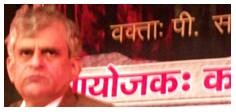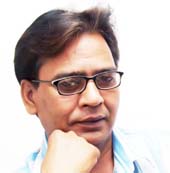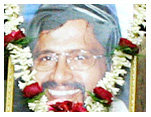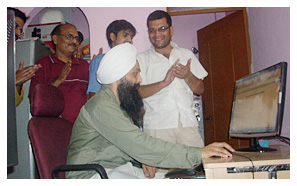 P Sainath talked a great deal about the phenomenon of Paid news in great details. He said that Paid news has been defined extremely well by the Press Council of India as any news or writing appearing as having been done in consideration of cash or kind. This phenomenon had been there in Indian media industry for at least the last decade as an undercurrent but 2009 became the year of Tsunami for Paid news. He said that he felt really satisfied by the fact that he could take credit for breaking the story of Paid news in Hindu during the period April to November 2009 during the Maharashtra assembly elections.
P Sainath talked a great deal about the phenomenon of Paid news in great details. He said that Paid news has been defined extremely well by the Press Council of India as any news or writing appearing as having been done in consideration of cash or kind. This phenomenon had been there in Indian media industry for at least the last decade as an undercurrent but 2009 became the year of Tsunami for Paid news. He said that he felt really satisfied by the fact that he could take credit for breaking the story of Paid news in Hindu during the period April to November 2009 during the Maharashtra assembly elections.
He was pained by this rampant presence of paid news in media and said without mincing his words-“ If journalists can’t finish paid news, paid news will finish the journalists.”
He narrated a story of a very respected and senior journalist of a Marathi media house who telephoned Sainath during that period and said that in his own newspaper there would be a paid news which would be bye-line his name while he had not written the news but it had come from a PR agency. He said that he just could not resist this command of his editor because unlike previous times when there was the protection of the Working Journalist Act, today he was working with the group on a contractual agreement of 11 months. With his daughters in college and an ailing mother to take care of, if he resisted the order he would be removed immediately from the job.
Thus Sainath feels that while previously due to the Working Journalist Act, the journalists had a choice to comply or to refuse, but today there is a dilemma to be corrupt or to leave the institution.
He gave the example of October 2009 during the Vidhan Sabha elections where he got information from the insiders themselves that a very big Marathi media group having 9-10 editions, had a meeting of its top executives, including those from Finance and Human Resources. The Head of the Finance department asked the editors present there what would be the estimated expenditure by the members of the leading political party candidates for each Assembly election. He was told that it would be around 3-5 crores. There are 288 seats in Maharashtra Assembly. For a party to be in power, it would need at least 145 seats. Thus these people calculated the expenditure of the leading political party for 145 seats to be around 145 multiplied by 3-5 crores, which came in the range of Rs. 435 to 725 crores. They also estimated the expenditure of other political parties and lesser candidates. The sum total of all was calculated as being Rs. 700 crore. The Chief Executive of the group clearly directed that they needed 30 percent of this amount. This came at Rs. 210 crores. In fact they finally got around Rs. 280 crores as paid news in the course of these Assembly  elections.
elections.
Saitnath said that today there were four kinds of paid news- prepaid, post paid, yet to be paid and never to be paid. In the Andhra Pradesh Assembly elections, there were about Rs. 1000 crore generated through paid news. Thus paid news has today become extortion by the media industry.
He said that he first came to know about this entire thing when a Minister of State in previous government personally complained him of these extortions when they met at an airport. He said that he was being asked Rs. 20 lakhs by the leading newspaper. Interestingly, he was himself a journalist for 30 years before entering politics. Yet, the same person later abstained from voting on the report on paid news which came for discussion before the Press Council of India.
Sainath mentioned the faxt that 10 of the most respected journalists of India including Late Prabhas Joshi, Ajit Bhattacharjee, Kuldip Nayyar had went to the Press Council ogf India and demanded enquiry on the subject. Pranonjay Guha Thakurdfrom Lok Sabha TV and Sreenivas Reddy of Vishal Andhra had presented a 72 page report which is available on Internet but the Press Council of India did not display it on its own website because the big newspaper giants pressurized the Press Council not to display this report and not to take any subsequent action upon this.
Yet Sainath felt proud of the fact that thousands of young, energetic and idealistic journalists have come forwarded against this phenomenon of paid news and have provided information against their own newspapers.
He narrated how even Rate cards were being distributed for paid news during the Maharashtra assembly elections where services like standard profile for 4 lakh, special profile for 8 lakhs and ‘dawn to dusk service’ for 25 lakhs were being offered openly to those who could manage. PR agencies and design agencies were openly working on these things and the son-in-law of an ex Chief minister headed one of these leading design agencies. He quoted one example where a news item bye-line from Madhav Kindhalkar was written about Ashok Chawan which praised Ashok Chawan so much that it looked completely artificial. There in 156 pages on Ashok Chawan himself by only one group, which shows the true extent of paid news.
He also mentioned an example where three newspapers Lokmat, Pundari and Maharashtra Times had all presented the same story on the same date about Ashok Chawan, word by word, which were said to be written by three different journalists. He said that as per his accounts of election expenditure SAinath obtained through RTI, he could get a rally of Salman Khan organized for only Rs. 4000 where Pandal cost Rs. 250, furniture Rs. 800 and so on.
Sainath feels that there have been active roles being played by the Election Commission of India (ECI) and the Securities and Exchange Board of India (SEBI) which have framed rules and regulations and have also started compliance of these regulations but the most unfortunate part is that there is complete media blackout of all these proceedings and activities. ECI had issued 87 notices in recent Bihar elections while SEBI has made it compulsory for newspapers to declare their interest in any corporate matter if they are presenting any positive story on them, though most of the media houses are openly flouting these rules. . He told that the final hearing of the case on paid news before ECI would be on 4th and 5th January 2011, which would be very important in its outcome. Only two media houses have brought these news so far, one being Star Maza.
Having presented all these problems. Sainath came up with a few solutions-
1. Need to have anti monopoly laws
2. Need to have cross ownership laws
3. Need to have one more Press Commission to look into the facts in a holistic manner
4. Dissolve Press Council of India and make a Media Council of India by giving it statutory and regulatory powers
5. Ownership of media houses by Trusts (for example the Guardian and the BBC- In fact, he called the Guardian as the best newspaper in the world)
6. Impose Working journalists Act
7. Start small and purposeful journals at local levels and also subscribe to such small journals like Nai Azadi from Bhopal
During the question-answer session, he said that Wikileaks were the best thing to happen in media because it has shown the emperor of the world as being naked.
I also asked him a question about how to distinguish a paid news from an ordinary and routine one which he answered by saying that many a times, it became quite obvious from the content of the news. I was not completely convinced by his answer and still feel that there needs to be more specific legal definition of Paid news to clearly recognize and separate it.
In fact, having heard the entire lecture, to me this remains as the most crucial and pivotal question which would need to be answered in an unambiguous manner with a great legal precision before one could go wholeheartedly against paid news.
Amitabh Thakur, IPS officer from Uttar Pradesh, currently at IIM Lucknow















PRATUL JOSHI
December 23, 2010 at 3:20 pm
journalists have become scapegoat for the mischief of their media house owners.